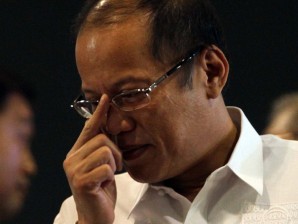
President Aquino: Failure to punish. INQUIRER FILE PHOTO
MANILA, Philippines—A group of prominent economists urged President Benigno Aquino to reconsider the merits of Charter change (Cha-cha), saying that the repeal of restrictive economic provisions are urgently needed to finally end the reliance of the economy on remittances from the Filipino diaspora.
In a July 13 open letter to the President, who reaffirmed his lukewarm stance on Charter change, the Foundation for Economic Freedom aid the Philippine economic growth had been propelled by consumption spending, mainly due to remittances of overseas Filipino workers and not by any action of the government.
“We want our growth transformed from a consumption-driven one to an investment-driven one because only an investment-driven growth will grow jobs and reduce unemployment, increase productive capacity, improve competitiveness, and put the country on a higher plane of sustainable growth,” said the FEF president signed by the group’s president Calixto Chikiamco.
FEF chaired is chaired by former Finance Secretary Roberto de Ocampo while its senior advisers are former Prime Minister/Finance Minister Cesar Virata, UP Economics Professor Emeritus and former Economic Planning Minister Gerardo Sicat and former Finance Minister Ramon Del Rosario Jr. Its board members are Romy Bernardo, Ernest Leung, Thomas Allen, Art Corpuz, Felipe Medalla, Vaughn Montes, Gary Olivar, Simon Paterno, Gloria Tan-Climaco and Francis Varela.
The FEF statement noted that the Philippines had one of the lowest, if not the lowest, investment rates in the region.
“Foreign investors don’t find it appealing to do business in the Philippines. Neither do local investors it also seems because our investment rate has fallen way below our savings rate. This is why our banks are awash with cash,” the FEF said.
“The consequence of this sad state of affairs is that our brother Filipinos are leaving the country in droves just to find jobs. Investors are hiring Filipino workers, just not here. The irony is that their remittances are driving consumption and growth in the economy, allowing politicians to claim credit for a growth that they were not responsible for.
One reason why investors are not coming to the Philippines, Chikiamco said, was because the basic law of our land was effectively saying that foreign investors were not welcome here.
“Sure, these Constitutional limits are being circumvented anyway, through the use of dummies or multiple layering of ownership, and other creative schemes. But this only results in ‘adverse selection,’ with those investors willing to make a mockery of our laws, coming here,” Chikiamco said.
But Chikiamco said the Philippines need to welcome foreign investors in areas only reserved for Filipinos in order to foster competition and improve Filipino consumers’ welfare. By keeping out foreign investors in certain areas of the economy, he said the country was inadvertently strengthening the position of domestic monopolies, especially in those areas where large amounts of capital may be needed.
“Therefore, if you want to improve consumer choice and welfare, you must support moves to liberalize the economic provisions of the Constitution,” Chikiamco said.
“You need not fear that Filipinos will lose out in competition by opening up the economy. Time and again, Filipino-owned enterprises have shown that they can compete with the best of them, like Jolibee, and even thrive in foreign shores. We have to have faith, Mr. President, that the Filipino will excel,” he said.
To transform Philippine growth from a consumption-driven one to an investment-driven one and to signal to the world that the country is open for business, FEF believes that the Philippines must lift the Constitutional restrictions of foreign ownership in mass media and advertising, educational institutions, land ownership, public utilities, and the exploitation of natural resources, except as provided by law.
In an interview, Chikiamco added there’s no better timing to reform the Constitution than under the current regime. “Timing is right because P-Noy enjoys high trust rating and there’s no fear he will use Cha-Cha to extend his power,” Chikiamco said. “Moreover, globalization has made liberalizing economic provisions in the Constitution more obvious and urgent.”